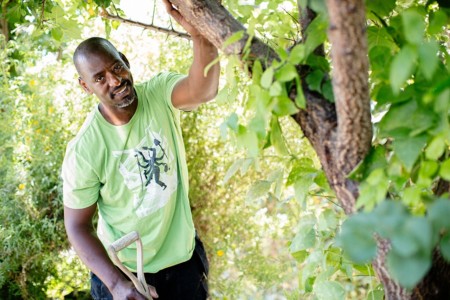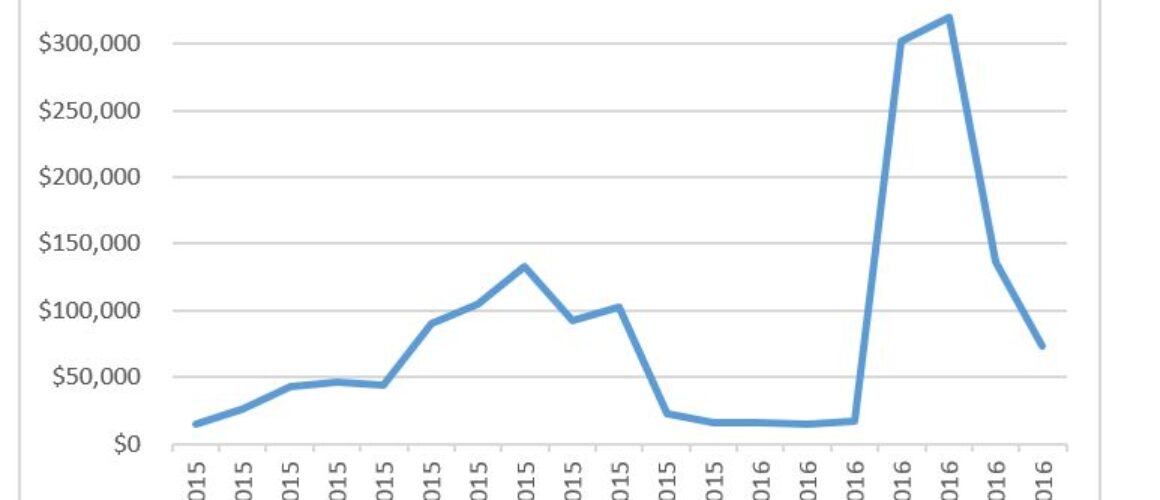The Future of Food: What’s On Trend and What’s Out at the Industry’s Biggest Show
This past week, the food industry gathered at Expo West 2017.
Denise Morrison of Campbell’s and Kathleen Merrigan, former USDA leader, keynoted Expo West, the natural and organic industry’s largest conference. That’s how far we’ve come—the future of food has a new look to it, and it’s decidedly powerful, with some strong female leads.
This year’s food show was packed, with 77,000 of your favorite foodies, funding vehicles and farmers.
The theme of the show definitely had a food+tech angle, with Campbell’s CEO, Ms. Morrison, talking about the incredible game-changing role that technology is having on our health. From personalized nutrition to the number of people checking online for recipes, to Amazon’s massive disruptive impact on the retail sector. Tech is playing a huge role.
Since 2010, 400 startups have received $8 billion in funding across the food eco-system. The space is just getting started. Almost 20% of our GDP is spent on managing disease and health care. Food can do so much of that, once we figure out better nutrition.
And that is what was on display this year. Sugar was out. It’s the new tobacco. Smart investors aren’t adding it to their portfolios.
What was in? Any beverage that is clear, with low to no sugar. These drinks are displacing Coke and Pepsi – from teas to kombuchas (which were on tap, like siding up to your favorite bar). Old school soda is in a death spiral. You wouldn’t want to be in charge of their P&L with the innovation that is happening in this space. You would want to be in charge of acquisitions, because it is the only way the beverage industry is going to grow. Kroger has proven that with their Simple Truth line – their brand that is free-from additives, GMOs, artificial ingredients and more – launched in 2012. Within 4 years, it hit $1.7 billion in revenue.
So what else was happening? The trends included:
- Low sugar
- Plant-based
- Non-dairy
- Gluten-free
- Non-GMO
- Fermented foods
- Snacking (it’s an $89 billion market)
The first day, I walked the floor with a friend who is producing Mark Bittman’s podcast and with Mark Bittman of the New York Times. I wish we’d had a microphone on Mark. His running commentary was hilarious. Just because we can invent certain things in the food industry, doesn’t mean that we should.
The question for innovators and entrepreneurs to ask is: Does this heal or hurt my consumer? I’ve shared the data thousands of times, but once again, here it is:
- 1 in 2 American men and 1 in 3 women are expected to get cancer in their lifetimes.
- 1 in 3 kids now has allergies, autism, ADHD or asthma
- 1 in 2 minority kids born in the year 2000 are expected to be insulin dependent by the time they reach adulthood, and 1 in 3 white kids.
- 2 out of 3 Americans are battling obesity and weight issues in a serious way.
You can’t just innovate for innovation’s sake. Just because you can do something doesn’t mean you should. Sorghum in chocolate? Not sure anyone is looking for that. But a kids’ supplement full of the heart-boosting, stress busting mineral magnesium, like Natural Vitality’s, now that makes sense.
There’s a lot that I loved about this year’s show and some that I didn’t. It very much is beginning to feel like the tech bubble of early 2000, where the space got so hot that everyone wanted in. I remember siting on the desk when those companies rolled through. It was pretty easy to quickly determine who knew what they were doing. The problem back then that I also now see in the food industry is uneducated capital, and people in it solely for the exit strategy.
Mark Cuban says, “Don’t start a company unless it’s an obsession and something you love. If you have an exit strategy, it’s not an obsession.”
No one lives and breathes this more than John Foraker, the head of Annie’s, and this year, he was recognized for his incredible role in the industry with an award. He took Annie’s public, successfully navigated the sale and transition of the company into General Mills, and is now also leading their Cascadian Farms division. He is one of my favorite people to see because his intellect, passion and ambition to change the industry are unparalleled. Cascadian Farms just joined Patagonia and the Land Institute to address soil erosion, greenhouse gas emissions, fertilizer runoff and more with an investment in Kernza, a new grain. When the history books are written on how we fixed our food system, his name will take up many chapters.

Transparency is the first ingredient in the recipe to earning consumers’ trust. The CEO of Campbell’s said that, and it is profoundly true.
The age of trying to tell her how to think, what to think, when to think are done. The consumer is thinking all of the time, because she is now managing either a life threatening food allergy, celiacs, diabetes or even cancer in her household. In many cases, she is managing multiple conditions. This puts her need for medications directly in conflict with her desire to invest in better for you brands. Brands like MegaFood are stepping in to help.
Brands like Schar, a gluten free bread company out of Europe get that. The founder, in his 60s, is a scientist at heart, engineering the best possible product for those dealing with Celiac Disease. And while the old school packaging does not convey the love and passion in the brand, make no mistake, it is there.
Brands like Health Warrior also know that they have to secure their supply chain to meet their numbers. If the demand is there but the ingredients aren’t, they’re screwed. So they’ve launched a Kickstarter to shine a light on their sourcing. It’s innovative, transparent and true. This is one of my favorite brands right now. Smart fuel for people getting smart about food fuel.
Creamy nut fillings are beefing up the protein profile of products, from Made in Nature to Clif Bar. High quality peanut butter is very much in. Brands like Good Spread are laying it on thick, raising awareness of malnourishment around the world, with one of the highest quality peanut butters on the market.
Sugar is out. Once we know better, we do better. And companies are shifting away from the white stuff. Investors are, too. If it’s already in their portfolio, fine, but they aren’t adding it. It’s the new tobacco. We now know what it does to our health, and responsible companies and investors are opting out.
What I love most are the alums in the food industry. Those that are constantly evolving, like the guy who founded Pirate’s Booty. He’s back with Vegan Rob’s, a snack line that is both nutrient dense, gluten-free and vegan. Do less harm. He’s so dialed into the industry, he’s someone you can look to as the compass. He knows what ingredients are hot and which ones to avoid. He knows that to be successful, you have to know the answer when asked: Does your product hurt or heal?
You can feel the success of the organic industry by the fact that Campbell’s CEO gave the keynote on the state of the industry. She’s in and had every reason to be on that stage because she broke with the status quo that the Grocery Manufacturers Association tried to maintain, and moved with her consumers, calling for mandatory, on package labeling of GMOs. She spoke about her desire to be the biggest, small food company, one that is a portfolio of many better for you brands. She also spoke about personalized nutrition, leveraging data and apps and technology, spun around and shared that their app, Habit, helped her lose 18 pounds.
There was something so real in that moment—her authenticity said: we are in this together.
We are. We are all Americans before we break into Republicans or Democrats. We are all eaters, before we break into conventional and organic.
Perhaps the most significant issue is the one that my brilliant friend, Matthew Dillon of Clif Bar shared: farmers no longer own their land. In many cases, they are on leases with payments due to landowners who know little to nothing about the soil or land management beyond the balance sheet. That presents an acute problem in financing the growth of the organic industry. Tenant farmers who are not land owners don’t have the financial flexibility needed to make the long-term decisions. So how do we refinance the farm?
Less than 5 million of the over 900 million acres used to grow food in this country are organic. Less than 1%. Kashi is trying to tackle it with a certified transitional program open to anyone. Nature’s Path, with its extraordinary integrity, is trying to do it, too. There is a long list of companies, from Costco to White Wave, with their focus on this. Regenerative agriculture is also a buzzing term in the industry. How do we heal the soil?
But this event needs a call to action around this.
So next year? Let’s leverage the almost 80,000 people on that trade show floor and send a message: with the growth in the food industry coming almost exclusively from this category, we have to finance the farmers’ conversion to organic. From leasing issues, to storage and holding tanks, to delivery of commodities, how do we build that system?
It’s the future of food, and we have to finance the future from the farm to the fork. It’s a line on the balance sheets that we have to get straight.
What isn’t linear is the curve of the heart found in this industry and the passion. Food is sensual, sensory and serves a powerful role in our health. It’s the kombucha on tap on show on the trade show floor – fun and irreverent. It’s the turmeric tucked into snacks and in supplements, tackling inflammation to help you feel better and do more. It’s the liquid snacks out of Garden of Life, protein shakes, organic, certified, B-corps.
There is so much love in this industry and so much passion. A mother protecting her baby, a husband protecting his wife. It’s the rocket fuel.
Companies that take care of consumers the way you’d take care of your own family are winning. If your brand radiates that, you’ve got your rocket fuel for success. Tap into it, foster it.
Food is so deeply personal. We’ve come out of the age of industrialized, processed food, thank goodness.
The future of food is no longer one-size-fits-all. It’s about personalized nutrition and meeting the changing needs of the 21st century family.
















 “Since 1969, dozens of studies of food-grade carrageenan have been published in peer-reviewed academic journals. Results from these scientifc experiments point to harmful effects from food-grade carrageenan in the diet.
“Since 1969, dozens of studies of food-grade carrageenan have been published in peer-reviewed academic journals. Results from these scientifc experiments point to harmful effects from food-grade carrageenan in the diet.